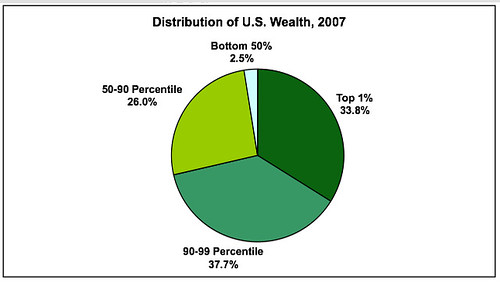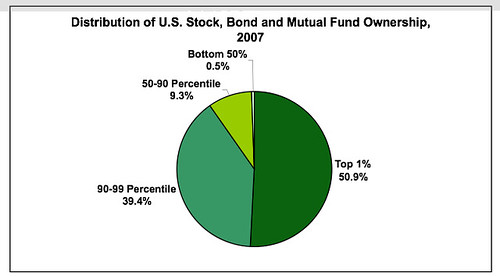Nine Pictures of the Extreme Income/Wealth Gap
by Dave Johnson, Seeing the Forest, February 14, 2011
Readers, in the interests of saving space, I didn't post the first half of this article which gives examples of wealth and what you can buy with one billion dollars -- go to link below to see the photos.
...So, as you see, $1 billion is more than enough to really live it up. People today are amassing multiples of billions, paying very little in taxes and using it in ways that harm the rest of us.
How Extreme Is The Concentration?
Now you have a way to visualize just how much money is concentrated at the very top. And the concentration is increasing. The top 1% took in 23.5% of all of the country’s income in 2007. In 1979 they only took in 8.9%.
It is concentrating at the expense of the rest of us. Between 1979 and 2008, the top 5% of American families saw their real incomes increase 73%, according to Census data. Over the same period, the lowest-income fifth (20% of us) saw a decrease in real income of 4.1%. The rest were just stagnant or saw very little increase. This is why people are borrowing more and more, falling further and further behind. (From the Working Group on Extreme Inequality)
Income VS Wealth
There are a few people who make hundreds of millions of income in a single year. Some people make more than $1 billion in a year But that is in a singleyear. If you make vast sums every year, after a while it starts to add up.(And then there is the story of inherited wealth, passed down and growing for generation after generation...)
Top 1% owns more than 90% of us combined. "In 2007, the latest year for which figures are available from the Federal Reserve Board, the richest 1% of U.S. households owned 33.8% of the nation’s private wealth. That’s more than the combined wealth of the bottom 90 percent." (Also from theWorking Group on Extreme Inequality)
400 people have as much wealth as half of our population. The combined net worth of the Forbes 400 wealthiest Americans in 2007: $1.5 trillion. The combined net worth of the poorest 50% of American households: $1.6 trillion.

Corporate wealth is also personal wealth. When you hear about corporations doing well, think about this chart:

The top 1% also own 50.9% of all stocks, bonds, and mutual fund assets. The top 10% own 90.3%.
Worse Than Egypt
In fact our country's concentration of wealth is worse than Egypt. Richard Eskow writes,
Imagine: A government run by and for the rich and powerful. Leaders who lecture others about "sacrifice" and deficits while cutting taxes for corporations and the wealthy. A system so corrupt that rich executives can break the law without fear of being punished. Increasing poverty and hardship even as the stock market rises. And now, a nation caught between a broken political system and a populist movement that could be hijacked by religious extremists at any moment.
Here's the reality: Income inequality is actually greater in the United States than it is in Egypt. Politicians here have close financial ties to big corporations, both personally and through their campaigns. Corporate lawbreakers often do go unpunished. Poverty and unemployment statistics for US minorities are surprisingly similar to Egypt's.
The Harmful Effect on The Rest Of Us
This concentration is having a harmful effect on the rest of us, and even on the wealthy. When income becomes so concentrated people who would otherwise think they are well off look up the ladder, see vastly more wealth accumulating, and think they are not doing all that well after all. This leads to dissatisfaction and risk-taking, in an effort to get even more. And this risk-taking is what leads to financial collapse.
Aside from the resultant risk of financial collapse, the effect of so much in the hands of so few is also bad psychologically. People need to feel they earned that they have earned what they have, and develop theories about why they have so much when others do not. Bizzare and cruel explanations like Ayn Rand's psychopathic theories about "producers" and "parasites" take hold. Regular people become little more than commodities, blamed for their misery ("personal responsibility") as they become ever poorer.
Teddy Roosevelt, speaking to the educators about "False Standards Resulting From Swollen Fortunes," warned that while teachers believe their ideals to be worth sacrifice and so do non-renumerative work for the good of others, seeing great wealth makes people think that obtaining wealth is itself a lofty ideal,
The chief harm done by men of swollen fortune to the community is not the harm that the demagogue is apt to depict as springing from their actions, but the effect that their success sets up a false standard, and serves as a bad example to the rest of us. If we do not ourselves attach an exaggerated importance to the rich man who is distinguished only by his riches, this rich man would have a most insignificant influence over us.
Societies that are more equal do better. In the book The Spirit Level: Why More Equal Societies Almost Always Do Better, Richard G. Wilkinson and Kate Pickett make the case that great inequality harms us physically as well as spiritually, and the these harmful effects show up across society. The book examines social relations, mental health, drug use, physical health, life expectancy, violence, social mobility and other effects and show how inequality worsens each.
Influence Buying
There is a problem of the effect on our democracy from the influence that extreme, concentrated wealth buys. In the book Winner-Take-All Politics: How Washington Made the Rich Richer--and Turned Its Back on the Middle Class, Jacob Hacker and Paul Pierson make the case that the anti-democracy changes we have seen in America since the late 1970s that led to intense concentration of wealth and income are the intentional result of an organized campaign by the wealthy and businesses to use their wealth to, well, buy even more wealth.
The secretive Koch Brothers are said to have a net worth of $21.5 billion each and are particularly influential. They financed the Tea Party movement and along with big corporations and other billionaires they financed the massive assault of TV ads in the midterm elections that helped change the makeup of the Congress. And now Congress is paying them back,
Nine of the 12 new Republicans on the panel signed a pledge distributed by a Koch-founded advocacy group — Americans for Prosperity — to oppose the Obama administration's proposal to regulate greenhouse gases. Of the six GOP freshman lawmakers on the panel, five benefited from the group's separate advertising and grassroots activity during the 2010 campaign.... Republicans on the committee have launched an agenda of the sort long backed by the Koch brothers. A top early goal: restricting the reach of the Environmental Protection Agency, which oversees the Kochs' core energy businesses.
We Must Address This
We owe it to ourselves to come to grips with this problem. We owe it to democracy to begin taxing high incomes and inheritance again. We owe it to future generations to use a temporary wealth tax to pay off the debt.
Resources
The Working Group on Extreme Inequality explains why inequality matters in many more ways, and is well worth clicking through to study. They also have a page of resources for study with links to other organizations. Also, spend some time at Too Much, A commentary on excess and inequality because it is "Dedicated to the notion that our world would be considerably more caring, prosperous, and democratic if we narrowed the vast gap that divides our wealthy from everyone else." The Center on Budget and Policy Priorities has a Poverty and Income area of research with good resources. The Center for Economic and Policy Research has a research section on Inequality and Poverty.







No comments:
Post a Comment